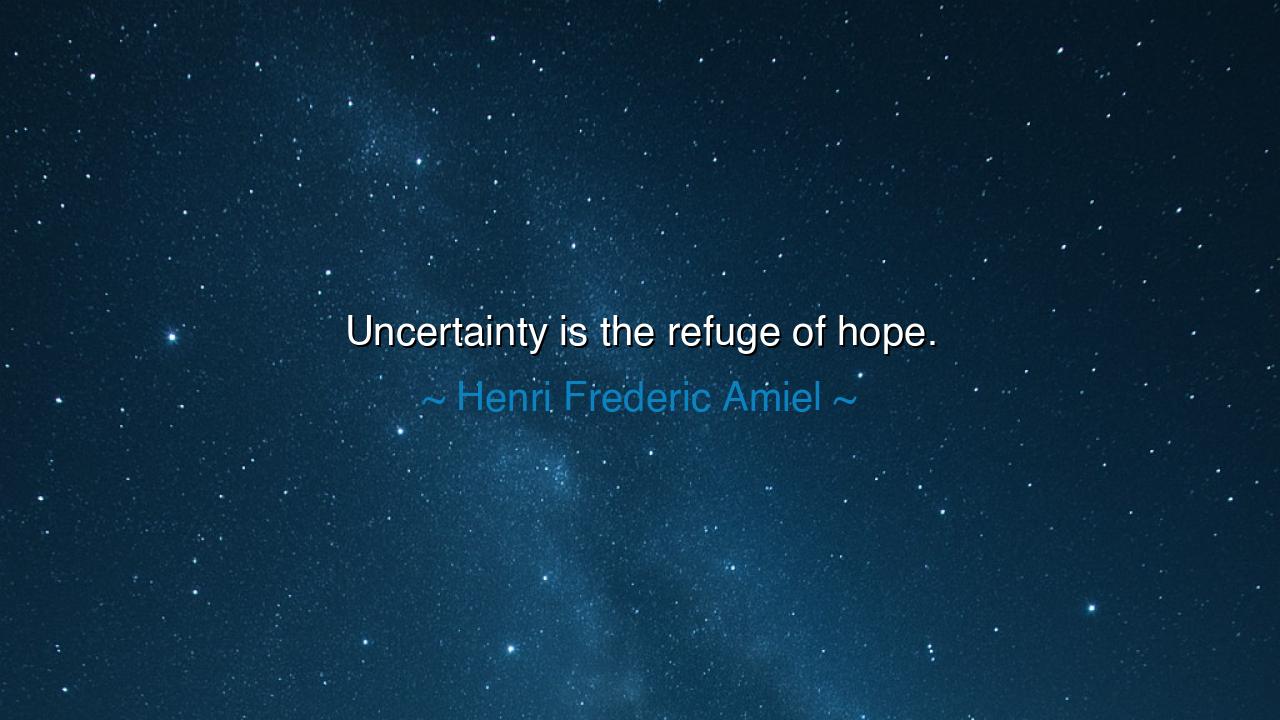
Uncertainty is the refuge of hope.






“Uncertainty is the refuge of hope.” Thus wrote Henri Frédéric Amiel, the philosopher and diarist whose words, born in the solitude of reflection, still burn with quiet truth. In this single phrase, he reveals a paradox that lies at the heart of the human experience: that hope—that most radiant of lights—does not arise from certainty, but from the shadows of the unknown. It is in the very spaces where we cannot see what comes next that the soul learns to lift its gaze toward possibility. Where the ground of assurance ends, the wings of hope begin to unfold.
The ancients understood this mystery well. They knew that if the future were certain, hope would be unnecessary. It is only when the path before us is veiled—when the winds of life scatter our plans like dust—that hope finds its dwelling place. Uncertainty, then, is not the enemy of faith but its very home, its sacred soil. Amiel’s wisdom reminds us that our longing for security, though human, can become a prison. True courage lies not in erasing doubt, but in enduring it with a heart that still believes in the dawn.
Consider the story of Ernest Shackleton, the explorer who set sail into the white void of Antarctica in 1914. His ship, Endurance, was trapped and crushed by ice, leaving him and his men stranded on a frozen sea. For months, they faced death with no assurance of rescue. And yet, Shackleton’s faith never wavered. He told his crew not that they would be saved, but that they must keep believing. In the face of uncertainty, hope became their fire, their sustenance. Against all odds, every man survived. That miracle was not born of certainty—it was born of the refuge of hope.
Amiel, a man of delicate thought and melancholy insight, knew that life itself is an ocean of uncertainty. He wrote not as one removed from struggle, but as one who had wrestled with doubt and sorrow. In the solitude of his journals, he found that it was precisely when all seemed uncertain that hope appeared—not as naive optimism, but as a quiet strength, a voice that whispers, “Perhaps.” That single word, “perhaps,” has saved more souls than the loudest certainties of men.
There is a divine irony in this truth. For when we stand in the clear light of certainty, there is no room for faith, no need for endurance, no call to trust. But when we walk in the twilight, uncertain of where the next step leads, we are forced to listen inwardly—to seek strength not from knowledge, but from the heart. This is the refuge Amiel speaks of: the inner sanctuary where hope shelters us from despair, where we learn to see that the unknown is not empty, but full of potential yet unseen.
Throughout history, every act of greatness has been born from this sacred uncertainty. The inventors who dared to experiment, the revolutionaries who fought for freedom, the lovers who pledged their hearts into an unknown future—all stepped into mystery. Uncertainty did not destroy them; it sustained them, because in it they found the promise of something better. Hope, like a flame, cannot live in the glare of the known—it needs the soft darkness to shine.
So let this truth take root in your heart: do not fear uncertainty. Welcome it as the realm where your spirit may grow strong. When the path ahead dissolves into mist, when the future is hidden from your grasp, do not curse the darkness. Sit beside it, and let hope keep you company. Remember that uncertainty is not a void—it is a womb, in which the seeds of tomorrow are growing, unseen but alive.
And so, as Amiel teaches across the centuries, hope does not die in uncertainty—it dwells there. When all answers fade, let your faith remain. When clarity abandons you, let courage take its place. For the wise know that it is not the clear skies that test the heart, but the storms. And it is within those storms that hope becomes our refuge, our light, and our proof that even in the unseen, life still reaches for the dawn.






AAdministratorAdministrator
Welcome, honored guests. Please leave a comment, we will respond soon